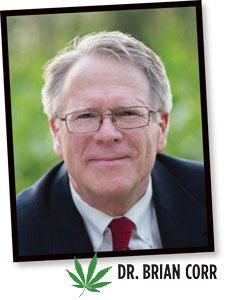1/1/2022
Sustainability is No Joke
Dr. Brian Corr

I know a guy who cares so little about sustainability and the environment that he got coal in his Christmas stocking ...
Environmentalists are trying to reduce plastic use, but they’re mostly just grasping at straws ...
I’m so committed to sustainability that I’m recycling jokes.
But seriously, folks … sustainability has finally become embedded in almost all industries, as well it should, and the cannabis industry is no different. However, sustainability is difficult to define, meaning different things to different people. With the incredible diversity of the cannabis industry, sustainability means very different things depending on who’s doing the defining.
For many people sustainability only means environmental conservation. However, by itself that’s not a sustainable definition of sustainability. No business is sustainable if it’s unprofitable. Going as far back as the 1990s there’s been an awareness of the “triple bottom line,” meaning a corporate bottom line should consider not only profit, but also people and the planet (the “Three Ps”).
The United Nations defines sustainable development (although that’s not necessarily the same thing as sustainability in a company) as “harmonization of economic growth, social inclusion and environmental protection.” This is expressed in the concept of a sustainable company, described with the acronym ESG—Environment, Social and Governance.
Considering the “Environment” part of ESG, the cannabis industry has improved, but still has opportunities for improvement. Traditional cannabis production oftentimes was the poster child of how to not be environmentally sustainable. Indoor production used (and in some cases still uses) tremendous amounts of energy to power lights, cooling and dehumidification. A paper published in 2012 estimated that, at that time, production of a kilogram of cannabis resulted in 4,600 kilograms of carbon dioxide emissions to the atmosphere.
Even outdoor cannabis production, which should be energy-efficient, in the past was often far from sustainable. To hide production, illicit producers often would carve out production space from wild lands, use all sorts of toxic pesticides, dam up and siphon water from streams, and leave the site a wasteland after harvesting the crop.
Cannabis production has come a long way toward environmental responsibility. Use of LED lights rather than HPS or metal halide requires less energy for a given amount of light, which also results in lower requirements for cooling. Growers are learning to grow in greenhouses, using sunlight rather than using only artificial light. Producers who once might have over-irrigated with nutrient solutions resulting in runoff of nutrient-rich water have learned how to use pulse irrigation to minimize runoff. Producers have learned that massive amounts of phosphorus in the fertilizer solution are unnecessary to produce a good crop, resulting in less phosphate runoff, reducing the eutrophication of lakes.
Selection of growing medium is a factor in sustainability. Media composed of coconut fiber or peat moss may be sustainable in that these resources are renewable, but in most cases they’re transported long distances, increasing the carbon footprint. Rockwool media require significant energy inputs to manufacture and also often are transported long distances. Rockwool media cannot be composted, but even compostable media often end up in landfills due to regulations that restrict how cannabis waste is handled. The entire lifecycle of the medium needs to be considered when evaluating environmental sustainability.
The “Social” aspect of ESG is perhaps the most difficult of the three categories to quantify. The social criterion considers how a company treats its stakeholders—employees, suppliers, the community, etc. The cannabis industry has a mixed record on social issues.
Many cannabis companies support their local communities with volunteer work or support local charities with financial contributions. However, in some cases, the local community is impacted by odors from production. Most cannabis companies take good care of their employees, but like many horticultural operations, cannabis production can have peaks and valleys of labor requirements. Many cannabis employees complain of unpredictable schedules. Some cannabis employees have unionized to allow for collective bargaining for not only salary, but improved working conditions.
One would think the “Governance” part of ESG would be easy for the cannabis industry since it’s such a highly regulated industry. For this reason, good governance is built into the fabric of what most cannabis companies do each day. Transparent accounting methods are typically integral to cannabis companies, since regulations require careful tracking of production, processing and sales.
However, good governance also requires managers and board members avoid conflicts of interest, to avoid using political contributions to gain favorable treatments and, of course, to avoid any illegal activities. Sadly, there have been multiple instances of cannabis company executives being charged with fraud.
The cannabis industry, like all industries, needs to be conscious to avoid “greenwashing”—displaying the appearance of environmental responsibility with little action. Words and phrases like “all natural,” “eco-friendly,” “green” or even “sustainable” have little meaning unless they’re backed up with specific actions.
To help create some specificity regarding sustainability in cannabis, ASTM International (formerly the American Society for Testing and Materials) has a subcommittee specifically working on setting standards for cannabis sustainability.
Companies that pay attention to ESG tend to thrive. Good environmental practices are noticed by customers, employees are more loyal and productive when they’re treated well, and good governance results in good tracking of financial performance. Any industry ignores sustainability at its peril—a 2020 survey showed 79% of consumers made purchase decisions taking sustainability in mind.
Did you hear about the cannabis producer who decided to be more sustainable by feeding his cannabis waste to cattle? The steaks have never been higher …
Since profits, people and our only planet are the focus of sustainability, the STAKES also cannot be higher. GT
Dr. Brian Corr is a consultant with more than four decades of experience in the greenhouse industry. He has advised legal cannabis producers for the last seven years. You can reach him at Brian.Corr@SycamoreHortConsulting.com.